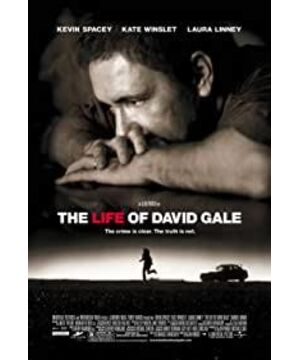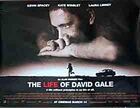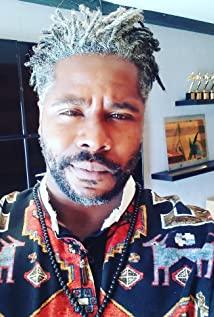At the beginning and near the end of the film, there are pictures of Bixi running in the field, below is the newly turned black dirt, above is a woman running firmly. Dirt breeds life, and running is life beating. This is an ode to life, but the sad man chose death. "The king does everything in the world, and wins the name of his predecessor and his later." Gore's name is only left to the son he cares about most, and his lifelong belief - the abolition of the death penalty. Everything went as he wished, his unjust case made the abolition of the death penalty overwhelming, and his wife finally understood the truth after receiving Pauline's confession letter.
A well-planned murder has made Gore blamed, but the truth of the matter is directed and acted by him in order to create a powerful argument against the so-called justice of the death penalty. His best friend Constance committed suicide in a brutal way, and he had to witness the process of death. The female reporter went crazy after seeing all this on the disc. Does it really have to be death to end it all?
Regarding the thinking about death, a previous film "Sleeping in the Deep Sea" once explained that for those painful bodies, only death can free the soul. The proposition that this film always insists on is to abolish the death penalty and save lives on the edge. One talks about death and the other about life, but the thoughts for the viewers cannot escape the word "life". No matter how many changes in life, life is always worthy of our respect and love.
The most impressive thing in the film is Gore's calmness in revealing the truth of the case. Everything goes as smoothly as he planned, his reputation will be clarified, and his faith will be realized by later generations. It seems that the "key of freedom" that has been alluded to in the film was also taken by him. Some people say that Gore was a martyr of faith, just as Jesus walked to the execution platform three days later, Christ came to the world, Gore announced the truth three days later, the death penalty began to be questioned again, and the remaining condemned prisoners may be redeemed . However, looking back at the life of Gore, an otherwise brilliant philosophy professor with a lovely son and a close ally, his peaceful life was destroyed by a false accusation, he was notorious as a rapist, lost his job and got a divorce , In the end, even his beloved son was taken away, the house was sold, he could only survive in the car, and the only friend he could rely on, Constance, was also terminally ill. Life has come to an end, so Constance's absurd death plan has his solidarity, and at the moment when their bodies meet, pure friendship sublimates into a dying sympathy and mutual support for an ideal. But this is not the abandonment of life, but a kind of nirvana, washing away the stains of a lifetime in the tragic and solemn saving of other lives, and also washing away the heavy load of the soul. At this point, he really found his "key to freedom".
For the theme of death in the film, I would like to quote the beautiful legend about the thorn bird: "There is a bird in legend that sings only once in its life, but its song is more sweet than any creature in the world, and once it leaves its nest Go to the thorn tree, you must find it before you can stop. It nailed itself to the sharpest and longest thorns, and sang softly among the branches of the eucalyptus. It transcended the agony of dying, and sang better than the lark and the nightingale. Once The swan song is at the cost of life! But the whole world is listening with bated breath, and even the God in the kingdom of heaven is smiling. Only by enduring great pain can one achieve the state of perfection... Maybe the legend is like this."
View more about The Life of David Gale reviews











